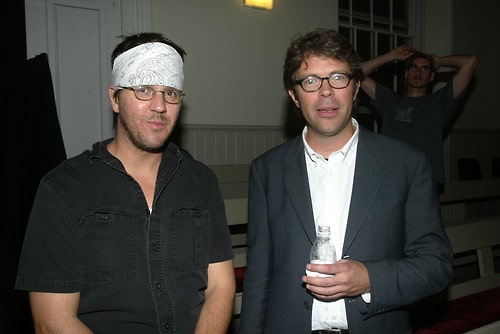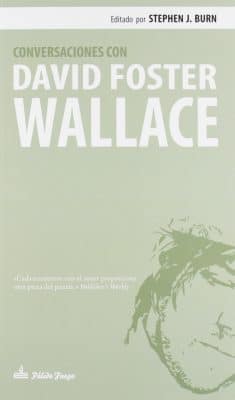From David Fostwer Wallace we are left with his novels, his reports, his stories, his phrases and, above all, his thought and his way of being in life. And to abandon her. It shouldn't be easy to collect 19 interviews (+1 report) from a writer (especially one like David Foster Wallace) and that the book doesn't turn into an infinite joke of echoes of overlapping and repeated ideas. Stephen J Burn, editor of Conversations with David Foster Wallace, you have done your job well. In this magnificent book of interviews, published in Spain by Pálido Fuego, You can find all the immortal phrases of David Foster Wallace that summarize his legacy. Whether as a writer, thinker, literary critic, analyst of postmodern society or addicted viewer to television. This book is like a long chat over several years with someone you wish you had as a friend. (aka Jonathan Franzen).
The compilation of almost two decades of testimonies from the father of system broom, The infinite joke o The girl with the weird hair It provides a double stimulus for the reader. With these interviews with David Foster Wallace we delve into the explanation of his particular vision of the world and, also, in the explanation of its literature. And with his work we are not referring to his novels, stories and reports, but to his concept of what (good) literature is and should be. The kind of books in which he is willing to invest his time and desire.

Jonathan Franzen and Foster Wallace
Although the claim on the cover is true (“Each encounter with the author provides another piece of the puzzle”), the potential of this sweet book is not its contribution to the unraveling and understanding of an existential torment that turned into suicide (and subsequent canonization). As much as it gives us several climax moments like that of the sister ("I can't get the image out of my head (...) David and his dogs; it is dark. I'm sure he kissed them on the mouth, and he told them he was sorry"). The forte of Conversations with David Foster Wallace is elsewhere.
damn postmodernism
At times, it's almost a theory manual, enjoyable even for those who don't even know who David Foster Wallace was. Marvelous, being able to read in black on white one of the most accurate diagnoses of an era:
“Irony and cynicism were what the American hypocrisy of the fifties and sixties required. It was what made the first postmodernists great artists. The great thing about irony is that it separates things and lifts us above them so that we can see the flaws and the hypocrisies and the duplicities (...) Sarcasm, parody, absurdity and irony are great ways to take off the mask to things to show the unpleasant reality behind them. The problem is that once the rules of art are discredited, and once the unpleasant realities that irony diagnoses are revealed and diagnosed, what do we do then? (…) What do we do now? Apparently all we want to do is keep ridiculing things. Postmodern irony and cynicism have become an end in themselves, a measure of fashionable sophistication and literary savvy. Few artists dare to talk about what is wrong with the ways of moving towards redemption, because they will seem sentimental and naive to all the jaded ironists. The irony has gone from liberating to enslaving.”
This drops a David Foster Wallace aged 29 to Larry McCaffery 33 pages after the interview began for Review of Contemporary Fiction It dates from 1993. After reading the diagnosis, one can only close the book for a moment, get up, look around and shudder with the full validity of the postulate. This week, after the first and only television debate prior to the elections on November 10 in Spain, the most commented issue on social networks (with drunken sarcasm and irony, of course) was the "blowjobs" that Pablo Iglesias pronounced, we suppose that by mistake, while talking about feminism and equality.

David Foster Wallace in a 2002 image
That's what we're talking about. From David Foster Wallace, a writer who used his embarrassing clairvoyance to capture and summarize the defining elements of an era and transform them into literature.
Another example. The era of mass media:
“The world we live in is very different. Now I can get up and watch satellite footage of a riot in Beijing while eating a Tex-Mex breakfast and listening to Third World music on my CD player. The function of narrative used to be to make the strange familiar, to take you anywhere and make you feel at home there. It seems that one of the characteristics of life today is that everything is presented as something familiar, so one of the things that the artist has to do is remind people that a lot of this familiarity is actually strange.
Sometimes, it is not so much what he says but how. That apparent simplicity to condense sharpness and clarity, telling you that “there is a click Madame Bovary that, dammit, if you don't feel it, there's something in you that doesn't work".
Or the way in which David Foster Wallace wonders to what extent "do we need fiction that does nothing but dramatize how dark and stupid everything is?", to then ensure that "in dark times, acceptable art would be that which locates and effects a cardiopulmonary resuscitation on those magical and human elements still alive and resplendent despite the darkness of time.”
Foster Wallace, an author of his time
Consistent with his long youth and television addiction, David Foster Wallace's answers in his interviews are the same as his life and work: rivers in which currents of philosophy, literary theory, tennis, mathematics, rap and MTV are combined. As a postmodern and realist writer, he felt that dodging pop references was retrograde: "In terms of the world I live in and try to write about, it's inescapable."
David Foster Wallace's iconic bandana was just there to curb the sweat. Anyone who has seen or heard one of his interviews will know how much thought went into each answer. This is also evident in the book, with assertions and self-refutations full of formal doubt, of "I don't know if I'm explaining myself" or "this probably doesn't make any sense".
David Foster Wallace was obsessed with language to the point where he found some of the theories of thought "compelling" that claim that "there really is no meaningful reality outside of language. That language creates, in a rather complicated way, what we call reality. Wittgenstein put him.
Give the following video a chance to understand the complete essence (more or less) of a human being in a matter of three minutes of gestures and rushed words . This is a collection of cuts from a single interview! where we see how David Foster Wallace suffered and sweated every word in order to convey his ideas with maximum accuracy. The interview is from 2003 and was for the German network ZDF (and you can see it complete in this link):
Of course, in addition to tragicomic teachings, riding a Conversations with David Foster Wallace, the writer's acolytes will see their hunger for biographical data fully satisfied. His parents read aloud to each other the Ulises de Joyce before going to sleep, at the age of eight they had already read him Moby-Dick etc..
parishioners fosterwallians they will see how the years modulate the writer's discourse; the way in which the "uncle" or the crazy confessions and the ignorance of the most basic rudiments of the development of an interview give way to more thoughtful, solemn and typical answers of someone who begins to assimilate how much truth there is in that that “The older you are, the smarter your parents are.”
David Foster Wallace. It should have been interesting to meet him.
David Foster Wallace, Conversations with David Foster Wallace (Editing by Stephen J. Burn)
Translated by José Luis Amores Baena
Pale Fire, Malaga 2012
238 pages | 18 euros
